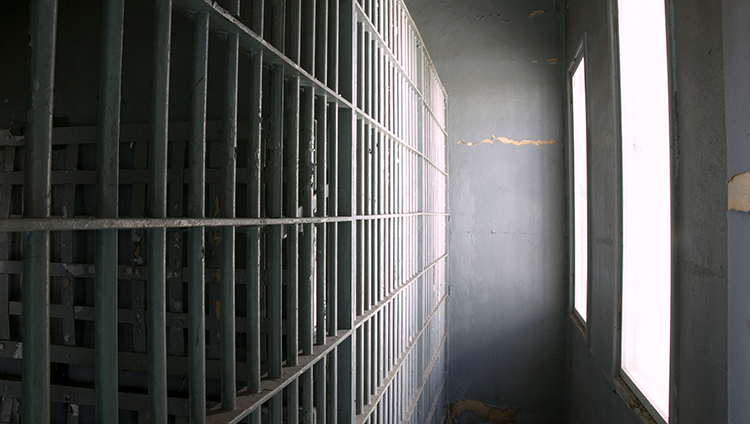Push by Corrections Committee leads to ABA opposing investments in private prisons

Within the ABA Criminal Justice Section, there is a group dedicated to studying sentencing, correctional institutions and the experiences of incarcerated people. (Image from Shutterstock)
Within the ABA Criminal Justice Section, there is a group dedicated to studying sentencing, correctional institutions and the experiences of incarcerated people. From their research, they develop recommendations to improve prison systems and ensure that prisoners’ civil rights are being protected. It was through the work of this group that the ABA recently agreed to oppose investments in private prison systems.
Resolution 518 is one of the latest policy proposals put forward by the Corrections Committee, which is open for any interested ABA members to join.
The resolution was introduced to the House of Delegates at the ABA Annual Meeting in August by Stephen Saltzburg, who emphasized that its purpose was simple.
“We come before you with this resolution, which is three resolved clauses, and all of them do the same thing,” said Saltzburg, a Criminal Justice Section delegate to the House of Delegates. “They say, ‘Let’s not invest in private jails, prisons and detention centers.’”
Saltzburg noted that Resolution 518 built upon a measure the House of Delegates adopted in 2021. It urged all government entities to stop using private correctional facilities.
“It comes down to, simply: If you want to abolish private jails, prisons and detention centers, don’t fund them,” said Saltzburg, a professor at the George Washington University Law School.
The House of Delegates agreed, voting to adopt Resolution 518.
Issues with investing
John Dacey, the executive director of Abolish Private Prisons, a nonprofit corporation created by lawyers, professors and community advocates in Phoenix, is a member of the Corrections Committee. He and Robert Craig, the associate director of Abolish Private Prisons, brought the idea for Resolution 518 to the committee and helped draft the measure.
Specifically, the resolution calls on governments to adopt principles limiting investments in entities that generate revenue from incarceration facilities and supervision. It urges brokers, fund managers and private equity firms to create mutual funds and other investment vehicles that do not include these entities. And lastly, it encourages attorneys, judges and other stakeholders in the criminal justice system to avoid these entities in their investments.
“Fundamentally, what we’d like to see is especially government lawyers and judges not invested in the publicly traded, private prison corporation industry,” Dacey says, adding that CoreCivic and the GEO Group, the two largest private prison corporations, are publicly traded on the New York Stock Exchange.
In their initial research, Dacey and Craig found that the government retirement pension plans of many judges, prosecutors and public defenders are invested through index funds in stocks that include CoreCivic and the GEO Group’s stocks.
Dacey offers a hypothetical but realistic situation to explain why this presents potential conflicts of interest.
“You are the defendant in a criminal case, you’re beginning your trial and the trial judge says, ‘By way of disclosure, Mr. Defendant, I wish to inform you that the police, the prosecutor, your lawyer and I are invested in private for-profit prisons, but it’s a nominal amount. Do you have any concerns?’” Dacey says. “I can’t imagine any defendants saying, ‘No, that’s OK.’”
Approaching the ABA
Dacey and Craig also worked with the Criminal Justice Section’s Corrections Committee on the 2021 resolution urging governments to abolish private prisons.
“We’ve always seen the ABA as sort of a core partner in terms of advocacy,” Craig says. “Because as members of the legal profession, we think the relationship with private prisons drags the whole legal system down in the eyes of the public.”
Increases in crime and the number of individuals who are incarcerated is “good business news” for the private prison corporation industry, according to the report that accompanies the 2021 resolution. The report also said private prisons cost contracting governments more money but produce more harmful conditions for incarcerated individuals.
Like Saltzburg, Dacey and Craig say Resolution 518 seemed like a natural extension of the ABA’s stance on private prisons.
“We approached the ABA with this issue, because of some of the unique issues that pop up through lawyers and judges’ investments, dealing with conflicts of interest and the appearance of impropriety,” Dacey says. “We thought we might have an audience with the ABA that was interested in where the profession was investing.”
W. David Ball, the co-chair of the Corrections Committee, says his role is to support members who have experience with correctional institutions and understand what changes are needed in the industry.
Committee members have helped draft other successful policy proposals, including resolutions urging Congress to restore Pell Grant eligibility for individuals who are incarcerated and encouraging governments to promote the use of “people-centered language” when referring to currently or formerly incarcerated individuals.
Ball says he found Resolution 518 compelling, partly because of its overarching goals to ensure the criminal justice system remains impartial and increase public faith in the system.
“There’s room for lots and lots of different ideas,” says Ball, a professor at Santa Clara University School of Law. “Federal prisons have problems. State prisons have problems. And private prisons pose their own challenges and opportunities for the ABA to build policy.”
The House of Delegates will consider nearly 30 proposed resolutions at the ABA Midyear Meeting in Phoenix on Monday. This includes two measures sponsored by the Criminal Justice Section that involve the role of prosecutors.
For more information, visit the House of Delegates website.
Write a letter to the editor, share a story tip or update, or report an error.


